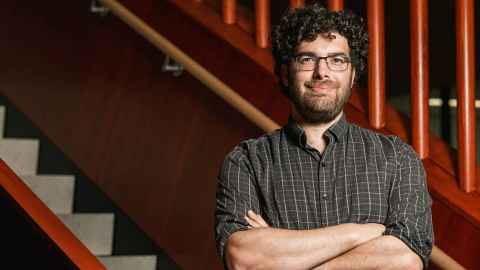Samuel Mehr's Music Lab probes the influence of music
22 May 2023
Dr Samuel Mehr is a psychologist who uses the fun and games of a citizen science research platform to probe the influence of music.

Dr Samuel (Sam) Mehr’s student job was a doozy. As an Eastman-trained freelance saxophonist, the Massachusetts local was at one point playing How the Grinch Stole Christmas a dozen shows a week while studying for his psychology doctorate at Harvard.
“In the basement of the theatre I would be reading papers on stuff like the origins of concepts,” laughs Sam, a recent arrival in the University’s School of Psychology as a senior lecturer whose Harvard doctorate was in human development and psychology.
But the combination of gigging and scholarly literature was not entirely random: Sam describes his overarching research questions as, “Why are humans so interested in music? Why do we do it all over the world?”
To this end, Sam has led projects looking at whether music appears in every society observed (it does); whether online listeners can correctly recognise lullabies and dance songs from diverse cultures (they mostly can); how and why music evolved; and whether there’s good evidence that short-term music education can help cognitive function in young children (there’s not).
This last revelation may be a shock and a relief to all parents who forgot to source Baby Mozart compilations, and Sam is bluntly reassuring: “There’s this pervasive myth about music lessons having all sorts of magical effects like better grades in other subjects, but the evidence is garbage.”
Instead, music lessons are a wonderful thing to pursue on their own terms – because music is wonderful.
There’s this pervasive myth about music lessons having all sorts of magical effects like better grades in other subjects, but the evidence is garbage.
Sam and his partner – also a developmental psychologist – are parents to children aged five and two, and have discussed how their research field “makes you a more sceptical parent”.
While parents are bombarded with information about what’s best for their kids, the evidence can often be murky and you don’t have to take straightforward claims at face value.
At the same time, having children can inform research design when you’re studying baby response.
“Enormous amounts of work go into seemingly mundane aspects of the experiment, like what colour are the walls? Does the room feel comfortable or scary? Just spending a lot of time around small children can give you helpful intuitions about how to do science with kids,” says Sam.
As a young music educator during his undergraduate years, he found working with parents and preschoolers fun and interesting – Saturday sessions with babies were “always kind of a riot”.
“Parents are very musical people whether or not they’re aware of it. When you have children, songs become part of a routine, part of daily life – that was interesting to me, I didn’t know that.”
The family first came to New Zealand five years ago when partner Alia accepted a job at Victoria University in Wellington, and then moved to Auckland in the 2022-23 summer after Sam won both a Marsden Grant and a Rutherford Discovery Fellowship. He also holds a part-time position as an adjunct professor at the Yale Child Study Centre, which hosts themusiclab.org, his citizen science/participant crowdsourcing hub that has already attracted 5 million participants. It was established in 2017 at Harvard, but is now jointly based at Yale and the University of Auckland.
Sam’s lab is about 70 percent web-based citizen science research and 30 percent research on music with infants and children, being conducted through the Early Learning Lab in the School of Psychology.
Including me. I spent an amusing and surprisingly challenging hour one recent morning noodling around at themusiclab.org, listening to bells and whistles to find out my “musical IQ” (humbling), whether I’m a “super listener” (only just) and whether I’m tone deaf (aced it!).
One of the quizzes was to find out what songs “the whole world knows”. I kept thinking of songs all day, after I closed the website. ‘Baby Shark’. ‘Macarena’. Hmmm. Sam and his team may need to put up a new quiz to find out what songs we actually like.
By Janet McAllister
This article first appeared in Ingenio Autumn 2023.